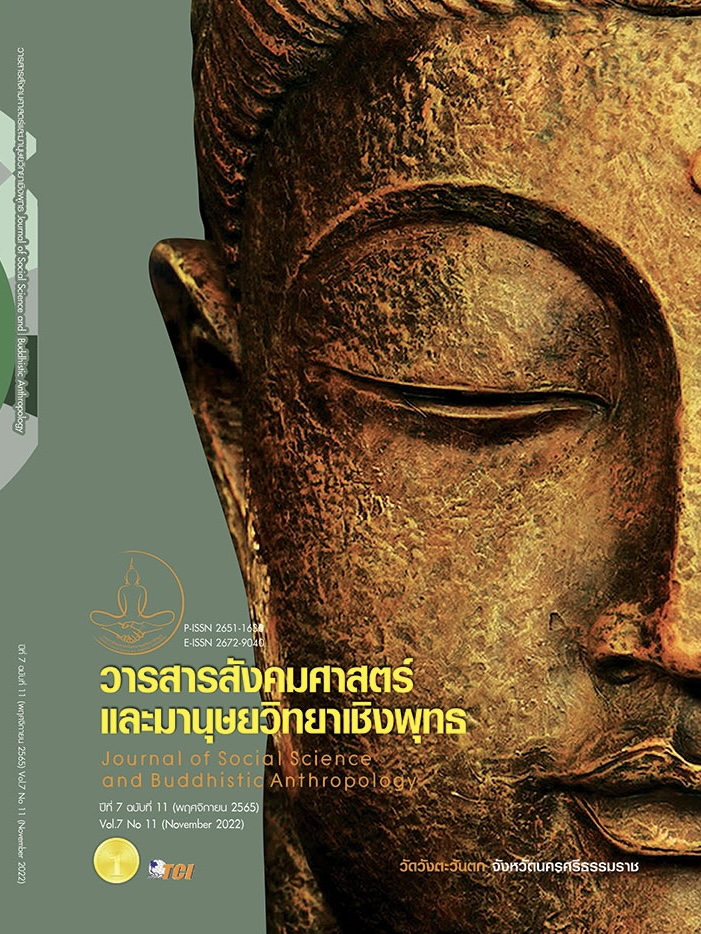A STUDY OF THE COMPONENTS OF ENVIRONMENTAL ETHICS BEHAVIOR FOR THE DEVELOPMENT OF A CURRICULUM TO PROMOTE ENVIRONMENTAL ETHICS BEHAVIOR FOR UNDERGRADUATE STUDENTS
Keywords:
Components of Environmental Ethics Behavior, Curriculum Development, Enhance Environmental Ethics Behavior, Undergraduate StudentAbstract
The purpose of this research was to study the components of environmental ethics behavior for the development of a curriculum to promote environmental ethics behavior for the undergraduate students. A qualitative research design was employed 3 steps; firstly, the documentary review was used for investigating the theoretical components of environmental ethics behavior. Then, an in - depth interview was used to collect the practical components of environmental ethics behavior that are appropriate for Thai society. Finally, a focus group discussion was employed to confirm the components of environmental ethics behavior. Data were collected by 11 conservation Buddhist monks for interviewing and 8 experts for focus group discussions. A purposive approach was used to select the key-informants and experts. Research data were analyzed with content analysis and interpreted with Analytic induction approach. The research findings revealed that the environmental ethics behavior comprised of 3 components. Those were: 1) Right conception as a deep understanding of the environmental issues and nature of reality 2) Right consumption was claimed to use the natural resources as long as needed and efficient use of resources 3) Right conservation was referred to the appropriate protection, preservation and management of the environment and natural resources based-on Buddha Teachings.
References
ฉัตรสุมาลย์ กบิลสิงห์และคณะ . (2534). พระพุทธศาสนาเพื่อการอนุรักษ์ธรรมชาติ. กรุงเทพมหานคร: โรงพิมพ์มหาวิทยาลัยธรรมศาสตร์.
ดวงเดือน พันธุมนาวิน และคณะ. (2556). ครูกับการเสริมสร้างจริยธรรมนักเรียน: คำถามและคำตอบ. กรุงเทพมหานคร: สำนักงานคณะกรรมการวิจัยแห่งชาติ.
พระครูถาวรพัฒนกิจ. (14 กุมภาพันธ์ 2564). องค์ประกอบของพฤติกรรมจริยธรรมสิ่งแวดล้อม และการอนุรักษ์สิ่งแวดล้อม . (นายเสาวพงษ์ ยมาพัฒน์, ผู้สัมภาษณ์)
พระครูวรวรรณวิวัฒน์ ดร. (13 กุมภาพันธ์ 2564). องค์ประกอบของพฤติกรรมจริยธรรมสิ่งแวดล้อม การอนุรักษ์สิ่งแวดล้อม และหลักพุทธธรรมในการอนุรักษ์สิ่งแวดล้อม. (นายเสาวพงษ์ ยมาพัฒน์, ผู้สัมภาษณ์)
พระครูสถิตธรรมาภิรักษ์. (14 กุมภาพันธ์ 2564). องค์ประกอบของพฤติกรรมจริยธรรมสิ่งแวดล้อม และการอนุรักษ์สิ่งแวดล้อม. (นายเสาวพงษ์ ยมาพัฒน์, ผู้สัมภาษณ์)
พระครูสุจิณนันทกิจ (สมคิด จรณธมฺโม). (14 กุมภาพันธ์ 2564). องค์ประกอบของพฤติกรรมจริยธรรมสิ่งแวดล้อม การอนุรักษ์สิ่งแวดล้อม และการสอนนักเรียนด้านสิ่งแวดล้อม. (นายเสาวพงษ์ ยมาพัฒน์, ผู้สัมภาษณ์)
พระธรรมปิฎก (ป. อ. ปยุตฺโต). (2543). การพัฒนาที่ยั่งยืน (พิมพ์ครั้งที่ 7). กรุงเทพมหานคร: สำนักพิมพ์มูลนิธิโกมลคีมทอง.
พระเมธีธรรมาภรณ์ (ประยูร ธมฺมจิตฺโต). (2538). ธรรมะและการอนุรักษ์สิ่งแวดล้อม. กรุงเทพมหานคร: โรงพิมพ์สหธรรมิก.
พระอาจารย์ ยงยุทธ ทีปโก. (14 2564 2564). การอนุรักษ์สิ่งแวดล้อม และการสร้างจริยธรรมด้านสิ่งแวดล้อม การช่วยเหลือชาวบ้านด้านสิ่งแวดล้อม . (นายเสาวพงษ์ ยมาพัฒน์, ผู้สัมภาษณ์)
พระอาจารย์ สาธิต ธีรปัญโญ. (13 กุมภาพันธ์ 2564 ). องค์ประกอบของพฤติกรรมจริยธรรมสิ่งแวดล้อม การอนุรักษ์สิ่งแวดล้อม และแนวทางการอบรมจริยธรรม). (นายเสาวพงษ์ ยมาพัฒน์, ผู้สัมภาษณ์)
พระอาจารย์ วีระยุทธ์ อภิวิโรห์. (12 กุมภาพันธ์ 2564). องค์ประกอบของพฤติกรรมจริยธรรมสิ่งแวดล้อม การอนุรักษ์สิ่งแวดล้อม และแนวทางการสอนสิ่งแวดล้อม). (นายเสาวพงษ์ ยมาพัฒน์, ผู้สัมภาษณ์)
วินัย วีระวัฒนานนท์. (2546). สิ่งแวดล้อมศึกษา (พิมพ์ครั้งที่ 3). กรุงเทพมหานคร: โอเดียนสโตร์.
สมพร แสงชัย. (2545). สิ่งแวดล้อม อุดมการณ์ การเมือง และการพัฒนาที่ยั่งยืน. กรุงเทพมหานคร: สถาบันบัณฑิตพัฒนบริหารศาสตร์.
หลวงตาประจักษ์ ธมมฺปทีโป. (12 กุมภาพันธ์ 2564). องค์ประกอบของพฤติกรรมจริยธรรมสิ่งแวดล้อม และแนวทางการปฏิบัติของนักอนุรักษ์. (นายเสาวพงษ์ ยมาพัฒน์, ผู้สัมภาษณ์)
หลวงปู่กิตติพงษ์ กิตติโสภโณ. (13 กุมภาพันธ์ 2564). องค์ประกอบของพฤติกรรมจริยธรรมสิ่งแวดล้อมการอนุรักษ์สิ่งแวดล้อม . (นายเสาวพงษ์ ยมาพัฒน์, ผู้สัมภาษณ์)
หลวงปู่เสน ปัญญาธโร. (12 กุมภาพันธ์ 2564). องค์ประกอบของพฤติกรรมจริยธรรมสิ่งแวดล้อม และการอนุรักษ์สิ่งแวดล้อม. (นายเสาวพงษ์ ยมาพัฒน์, ผู้สัมภาษณ์)
De Silva, P. (1990). Buddhist environmental ethics. In A. H. Badiner (Ed.). In Dhamma Gaia:A harvest of essays in Buddhism and ecology. (pp. 14-19). Berkeley, CA: Parallax Press.
De Silva, P. (1998). Environmental philosophy and ethics in Buddhism. New york: Martin’s Press.
Kopnina, H. (2017). Testing ecocentric and anthropocentric attitudes toward the sustainable development (EAATSD) scale with bachelor students. REBRAE Curitiba, (10)3, 457-477.
Lim, H. L. (2019). Environmental revolution in contemporary Buddhism: The interbeing of individual and collective consciousness in ecology. Religions, 10(2), 1-14.
Miller, G. T. Jr. & Spoolman, S. E. (2012). Living in the Environment: Conceptsconnections, and solutions, (17th. ed). CA: Cengage learning.
Patton, M. Q. (2015). Qualitative research and evaluation methods (4th. ed.). California: Sage Publications.
Puchta, C. & Potter, J. (2004). Focus group practice. London: SAGE publications.
Rolston III, H. . (2012). A new environmental ethics: The next millennium for life on earth. New york: Routledge.
Rubin, H. J. & Rubin, L. S. (2005). Qualitative interviewing: The art of hearing data. London: Sage Publications.
Shafiei, A. & Maleksaeidi, M. (2020). Pro-environmental behavior of university students: Application of protection motivation theory. Global ecology and conservation, 22(2020), 1-10.
United Nations. (1987). Report of the world commission on environment and development: Our common future. Retrieved Aug 18, 2022, from https://sustainabledevelopment.un.org/content/documents/5987our-common-future.pdf
Yunus, M. & Weber, K. (2017). A world of three zeros. New york: Public affairs.
Downloads
Published
How to Cite
Issue
Section
License
Copyright (c) 2022 Journal of Social Science and Buddhistic Anthropology

This work is licensed under a Creative Commons Attribution-NonCommercial-NoDerivatives 4.0 International License.









